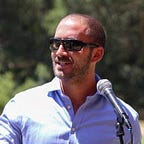Our world is on the threshold of Passover. A plague fills the air and death is felt all around us. Hebrew slaves take shelter in their homes, forbidden to go out. And it is at this time of terror that they mark their first festival, that for the first time in memory they act as one people.
What better time to recall this story? Even on the journey to freedom the Hebrew slaves despaired from the uncertainty ahead, fondly recalling their enslavement. At least in Egypt we had food, at least in Egypt we had life! How could something they had never known be worth the agony of chaos?
We mourn for yesterday despite its shortcomings. 2019 was a flawed world, one of poverty and inequality, prejudice and conflict. As a civilization we felt the inexorable pull towards a lower level of existence, one of tribalism and individual pettiness. And then a plague came. Death was all around us and we despaired. We withdrew into our homes, waiting as a people for the plague to pass over, just as the Hebrews had in Egypt. But instead of preparing for a departure, girding ourselves for a journey to a better place, we still pray for a return.
It was at this time that the Hebrews were offered two stories. The story they had grown up with, that the world was Egypt and Pharaoh its god, was as old as time and as strong as the pyramids. The story they were now asked to adopt, that they were a free people about to become a nation, was a story never yet told. There would be great loss on the journey from Hebrew slave to Israelite, but it was a story in which they were now the central player.
What stories are we telling today? There is one as old as memory, that this too shall pass and we will return to a familiar world; a world of corruption and autocracy but also of wealth and durability. The other story is just now taking shape, its destination still unclear. It could tell of a world of mass poverty and individual isolation, fear and nationalism. It could also tell of a world where the selfless activism of neighborhoods and communities around this country envision a future of collective responsibility and a new birth of citizenship, of finally seeing ourselves as the central player in our story.
The story we tell determines the path we take. For the Hebrews, this feast marked acting together as a people to adopt a new story, one that turned a narrative of plague into one of liberation.
